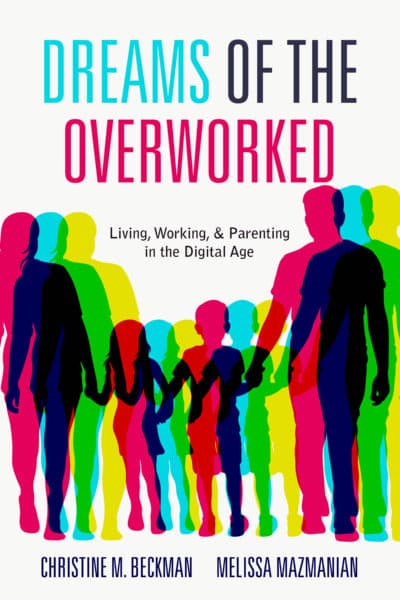Advertisement
Even Before Pandemic, Working Parents Struggled To Achieve The 'Dreams Of The Overworked'

It's no secret that parents are stressed out.
The fortunate ones are working remotely from home, trying to balance the needs of their jobs and their children being home 24/7. They are also facing the prospect that there will be limited or no in-person school again in the fall.
But as a new book points out, even before the COVID-19 pandemic, working parents were severely stressed: juggling the demands of careers, their families and their health, all with varying degrees of success.
In "Dreams of the Overworked: Living, Working, and Parenting in the Digital Age,” authors Christine Beckman and Melissa Mazmanian studied nine families who are struggling to encapsulate what they call the three ideals: the ideal worker, the ideal parent and the ideal body.
“Doing any one of these things to our aspirations is nearly impossible. Work, debt demands are always escalating. Parenting demands are a bit unreasonable, we might say,” Beckman says. “And so these working parents are always trying to juggle and trying to achieve on these three dimensions.”
Technology also complicates these goals by making people more accessible, Mazmanian says. People try to use technology to make them better at achieving these three ideals.
“But in so doing, we find ourselves in this trap where we're connected all the time because we all expect that each other is at each other's beck and call in service of being a good parent or a good friend or a good colleague,” she says. “And so the expectations of availability and responsiveness really ratchet up.”
Beckman and Mazmanian conducted this study before the COVID-19 pandemic forced many working parents to work from home while juggling children going to school remotely.
“It was hard before to be a parent and to juggle a job, and now you're a teacher as well as a worker, and you're having to monitor like, are they getting their homework done? Are they on the right Zoom call?” Beckman says. “[It’s] the coordinating not just of your own life, but of their lives.”
Advertisement
Many workers are reporting an increase in productivity while working from home due to the absence of a commute, fewer distractions from coworkers and fewer meetings. But Mazmanian says people who report a negative impact on productivity are likely parents.
“These are real differences in who's able to thrive in the workplace right now,” she says, “and I think it's on all of us to try and make that visible and make sure that we are able to accommodate the complexity of people's lives in the workplace.”
The pandemic is also complicating how parents care for their children because social isolation is highlighting the invisible work that goes into coordinating kids’ schedules, Mazmanian says. Parents used to have “scaffolding” — grandparents, babysitters, friends — who helped care for their children.
“It's not the default that there's one person at home and doing all that invisible work and in charge of the home front, and the other person going to work and not worrying about it,” she says. “So the need for scaffolding has become stronger, and even now, I think hopefully we're beginning to realize how important it is.”
Beckman says organizations also need to step in to support our increasingly complex lives.
“If companies are going to save 30%, 40% of their income on office space because we don't have that anymore, maybe companies need to do more to support us at home,” she says.
Companies could provide in-home childcare, help pay for grocery delivery and house cleaning, Beckman says. In other words, funds to help support the scaffolding that parents need to keep their complex lives going.
Beckman says now more than ever, parents need to let themselves off the hook, especially as they face the possibility that their kids won’t go back to school in the fall.
“I think we need to recognize how impossible it is and give ourselves a break about what is it that we can really stay on top of and what are we just going to sort of let go,” she says. “I mean, I think the perfect parent myth was already always one that had too many things that any one person can do.”
Emiko Tamagawa produced and edited this interview for broadcast with Tinku Ray. Samantha Raphelson adapted it for the web.
Book Excerpt: 'Dreams of the Overworked'
By Christine Beckman and Melissa Mazmanian
Nancy Huron’s day includes moments of joy, stress, productivity, and exhaustion. Nancy has a good job, happy children, close friends. At a fundamental level, she is privileged—and she knows it. Nancy feels like she “has it all.” And along almost any metric, she does. But her life is still a nonstop and intense grind.
Nancy’s life is driven by love for her children and her pride in her work. She tries to exercise and eat healthy food while maintaining a home. She craves downtime with friends, family, or occasionally just a People magazine. Nancy’s desires don’t seem unreasonable: work, parent, stay healthy, with a little bit of time to relax or socialize. So why does her life feel relentless (to her and us)?

The answer is that Nancy’s life feels relentless because impossible dreams—shaped by the particular place and time in which she lives—leave Nancy and her colleagues, neighbors, and friends all living with unreasonable aspirations. In this book we tease apart the different and compounding expectations that motivate Nancy (and others like her) to strive for the impossibility of perfection. We examine what helps her get through the day—from the mobile devices that keep her in the loop, to the caregivers who watch her children so she can work a full-time job. The expectations—or myths—of perfection that haunt Nancy pervade current U.S. society, and create an image of the kind of person we all should strive to be.
The threads of expectation that anchor Nancy’s life in cycles of satisfaction and guilt, and tie her to others, emerge from the overriding narrative of three dominant cultural myths—the Ideal Worker, the Perfect Parent, and the Ultimate Body. Striving to be an Ideal Worker, Nancy drops off her kids at 7:00 a.m. every morning so that she can grab a coffee, catch up on email, and get to work prepared and on time. Nancy’s phone and laptop are her conduits to work during her “off hours,” and she uses them to show her colleagues that she is dependable, accessible, and at-the-ready. For example, when her boss emails her on a Sunday afternoon asking about the status of a project, she uses her phone to immediately tap out a quick reply—commenting wryly, “Well, good thing I got that done this morning.” Her devices allow her to keep up with incoming emails, stay on top of tasks, and maintain a sense of competency and control.
Nancy carries the satisfaction of acting like an Ideal Worker alongside the guilt of not being a Perfect Parent. A single mother, she adores her children and constantly asks herself how to give them the childhood she feels they deserve—comparing their lives to the “great” childhood she had with her mother, who stayed home. She makes a conscious effort to put down her phone and play with or read to the kids in the evenings. She monitors how much TV and iPad time they get and makes sure their homework is done. With the help of babysitters for transport, both kids engage in afterschool enrichment activities. Several nights a week a babysitter will pick the kids up from school and take them to karate or gymnastics. Nancy usually checks the refrigerator before running out the door in the morning and texts the babysitter about what to do for dinner during a break in her schedule of back-to-back meetings. Nancy expects the babysitter on duty to monitor homework, feed the kids dinner, and try to get them bathed before she gets home between 7:00 and 7:30 p.m. Some sitters are better than others, and she works hard to stay in the good graces of those who can keep her children on schedule. Nancy measures herself against the ideals of the Perfect Parent, and she pieces together what she can.
After experiencing a major health scare, Nancy struggles to fit in regular exercise. When she responds to requests from colleagues in late-night emails, her hopes for early morning exercise are dashed. She has to decide whether to trade off sleep for exercise. Whichever she chooses, the result is a feeling of guilt. Nancy also works hard to provide healthy meals for herself and her children. Once a week she gets together with her neighbor to prepare a home-cooked meal. These nights are about more than a healthy dinner. Both families look forward to these nights as a time to relax and socialize. But such nights take planning—and rely on the neighbor being a stay-at-home mom who can make the last-minute run to the grocery store. For Nancy it is hard to find time to shop, much less cook. She wants to care for her body but simply cannot fit any more into the day. The myth of the Ultimate Body is often a reminder to Nancy of where she’s falling short.
Nancy’s life is hectic. The pressures are constant. At multiple points over the three years we spent with her, Nancy declared that this was the most stressful time she had ever experienced. If she could just get through the next two days, or two weeks, or two months, things would calm down. Like the conductor of an unruly orchestra, Nancy is forever trying to bring into synch the yearly rhythms of work (quarters, annual budgets, the holiday sales season), school (summer camps, new teachers, holidays, standardized testing), and her body (sleep patterns, medical treatments, hunger, pressure to exercise) with the inevitable and unexpected snafus of everyday life (an unhappy client, a child breaking an arm, the supermarket reorganizing where they keep the cereal).
How does Nancy strive for these three myths of perfection? She relies on her phone, tablet, and laptop to get through the impossible days. With the help of her devices, Nancy expects to do more than a day’s worth of work, be available to more people than those she is with physically, and handle more demands than one person reasonably can. She expects this of herself and others expect it of her. And while technology might help in the moment, over the course of weeks, months, and years of using it to do more, it only intensifies the pressures.
The real answer as to how Nancy manages can be found in the people that she is connected to through her devices. We can see it in the time and energy she spends fostering supportive relationships with babysitters and teachers. We can see it in the relationship she has with her neighbor, who texts her multiple times a day: saying “hi,” offering to pick up something at the store, or sharing a recipe. This network of human support is often masked by technology’s emphasis on individually managed lives, but it is the thing that keeps people going, no less striving.
Excerpted from DREAMS OF THE OVERWORKED: LIVING, WORKING, AND PARENTING IN THE DIGITAL AGE, by Christine M. Beckman and Melissa Mazmanian, published by Stanford University Press. ©2020 by the Board of Trustees of the Leland Stanford Junior University. All Rights Reserved.
This segment aired on July 13, 2020.

